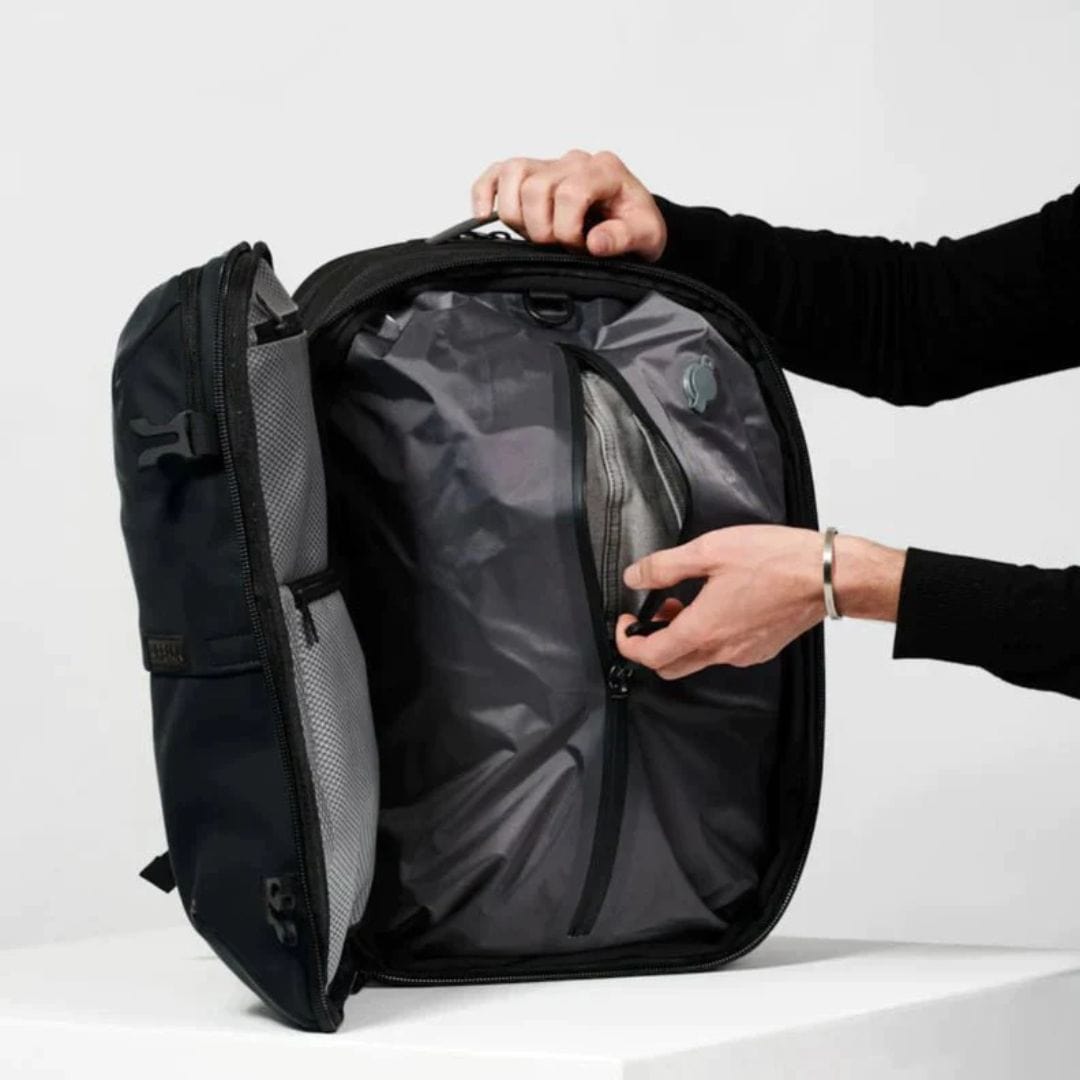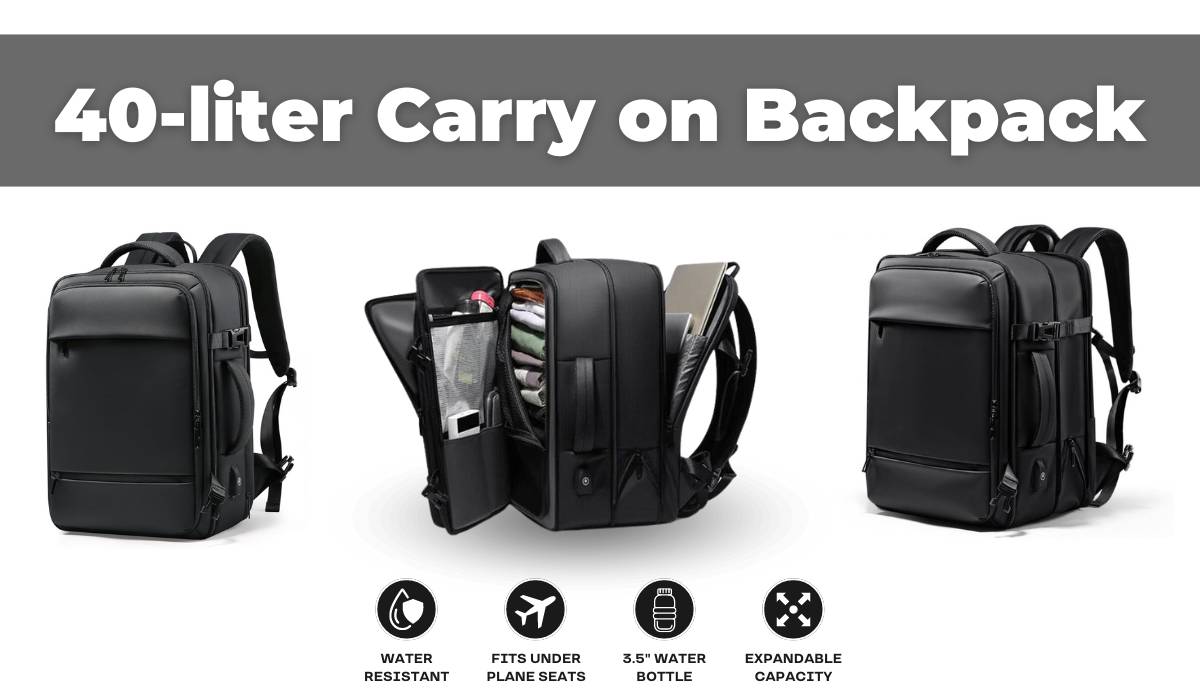Embarking on a journey is always exciting, but choosing the right travel backpack can be a daunting task.
One of the key considerations is size, and questions often arise about what constitutes the largest travel backpack size and whether it's suitable for carry-on. In this guide, we'll dive into the world of travel backpack sizes, airline regulations, and help you navigate the fine line between spaciousness and practicality.
Understanding Travel Backpack Sizes
Travel backpacks are versatile companions that cater to different needs and preferences. The key to finding the perfect backpack lies in understanding their sizes, typically measured in liters. The size you opt for should align with various factors, ensuring a seamless and comfortable travel experience:
Types of Travel Backpacks
| Backpack Type | Capacity (Liters) | Dimensions (Inches) | Ideal Use |
| Daypack | 15-30 | 16-20H x 12-14W | Day trips,Daily essentials |
| Weekender | 30-50 | 20-24H x 14-18W | Weekend getaways |
| Travel Backpack | 50-70 | 24-28H x 16-20W | Extended journeys,Travel needs |
How Size Influences Your Trip
The size of your travel backpack directly impacts your overall travel experience. Consider the following factors when choosing the right size:
Trip Duration
Shorter trips may only require a daypack, while longer journeys might necessitate a larger travel backpack.
Type of Items
Think about the items you need to carry. A daypack suits essentials, while a travel backpack accommodates clothing, electronics, and more.
Personal Preferences
Your preferred travel style matters. Some travelers prefer the simplicity of a smaller backpack, while others appreciate the spaciousness of a larger one.
Understanding domestic carry-on policies
Each airline may have specific guidelines regarding the size, weight, and number of carry-on items allowed. Generally, domestic carry-on size limits range from 45 to 56 linear inches, which includes length, width, and height. Weight restrictions may also apply, typically ranging from 15 to 25 pounds. It's essential to check the policies of the specific airline you're flying with, as these can vary.
For quick reference to airline carry-on rules, check our calculator here.
Is a 50L backpack too big for carry-on?
The suitability of a 50L backpack as a carry-on largely depends on airline regulations and your packing strategy. Understanding the advantages, disadvantages, and considerations can help you make an informed decision.
Versatile for Varied Trips
A 50L backpack provides ample space for short to medium-length journeys, offering versatility for different types of travel.
Avoiding Checked Baggage Fees
Carrying a 50L backpack as a carry-on can help you avoid checked baggage fees on airlines that permit this size in the cabin.
Efficient Packing
With thoughtful packing, a 50L backpack allows you to organize and access your belongings easily, enhancing overall travel convenience.
Quick Navigation
Having your essentials in a carry-on backpack facilitates swift movement through airports, public transport, and crowded spaces.
Airline Restrictions
Not all airlines have the same regulations regarding carry-on sizes. Some may consider a 50L backpack oversized, leading to potential issues at the boarding gate.
Potential Overpacking
The spacious nature of a 50L backpack might tempt overpacking, leading to a heavier load than necessary.
Limited Space for Specialty Items
Travelers with specific gear or equipment needs may find that a 50L backpack doesn't provide sufficient space for specialized items.
Stowing Challenges
On smaller aircraft or crowded overhead compartments, stowing a 50L backpack can be challenging, potentially causing delays during boarding and disembarkation.
Research Airline Policies
Investigate the carry-on size regulations of the airlines you plan to use. Some may be more lenient, while others strictly adhere to standard dimensions.
Trip Duration and Nature
Assess the length and nature of your trip. A 50L backpack is well-suited for short to medium-length journeys but might be insufficient for extended travel.
Packing Strategy
Adopt a strategic packing approach to make the most of the available space while adhering to airline guidelines.
By carefully considering these factors, you can determine whether a 50L backpack aligns with your travel plans and preferences.
The Largest Travel Backpack Size
What exactly is the largest travel backpack size? Backpacks exceeding 70 liters often fall into this category. These larger backpacks are favored by backpackers heading on extended trips or those who prioritize carrying a variety of gear. While they provide ample space, it's essential to consider whether such a size aligns with your travel style and destination.
 Discover the top-rated 70L backpacks in 2024 – click here for the best options!
Discover the top-rated 70L backpacks in 2024 – click here for the best options!
Main Advantages
Ample Storage
The primary advantage of the largest travel backpacks is their expansive storage capacity. Ideal for long journeys, these backpacks can accommodate a variety of clothing, gear, and equipment.
Extended Trips
If you're embarking on a prolonged adventure, such as backpacking through multiple countries or going on a months-long expedition, a large backpack allows you to carry all essentials without the need for frequent laundry or resupply.
Versatility
These backpacks often come equipped with multiple compartments and features, offering versatility in organizing your belongings. You can keep your gear well-sorted for easy access during your travels.
Outdoor Exploration
Tailored for outdoor enthusiasts, the largest backpacks are suitable for activities like hiking and camping, providing ample space for tents, sleeping bags, and other outdoor gear.
Disadvantages
Weight
One of the downsides of larger backpacks is the potential for increased weight, especially when fully loaded. This can impact your mobility and may pose challenges, particularly in urban environments or places with uneven terrain.
Size Restrictions
Some airlines and transportation modes may have restrictions on the size of carry-on luggage. A backpack exceeding 70 liters may not comply with these regulations, requiring additional fees or checked baggage arrangements.
Overpacking Risk
With more space comes the temptation to overpack. This can lead to carrying unnecessary items, increasing the overall weight and making the backpack more cumbersome.
Back Strain
Carrying a large and heavy backpack can strain your back, particularly if it lacks proper support or if the weight is not distributed evenly. This can result in discomfort and potential health issues over prolonged use.
Storage Challenges
Storing a large backpack can be challenging, especially in compact accommodations or when using public transportation. Limited storage options may pose difficulties during certain parts of your journey.
Conclusion
Choosing the right travel backpack size is about finding your perfect fit. The 30 to 50-liter range suits shorter trips, offering compactness and ease. Meanwhile, the 50 to 70-liter backpacks cater to longer adventures, providing ample space for diverse gear.
Share your choice with us! Are you a fan of compact convenience or the roominess of larger backpacks? Drop your thoughts in the comments below!














